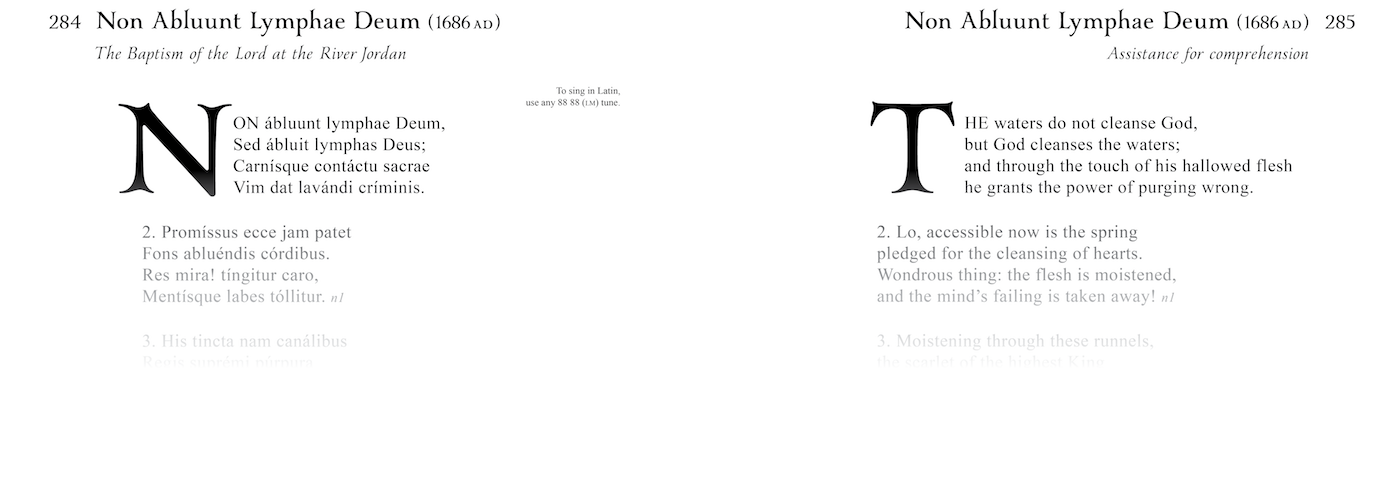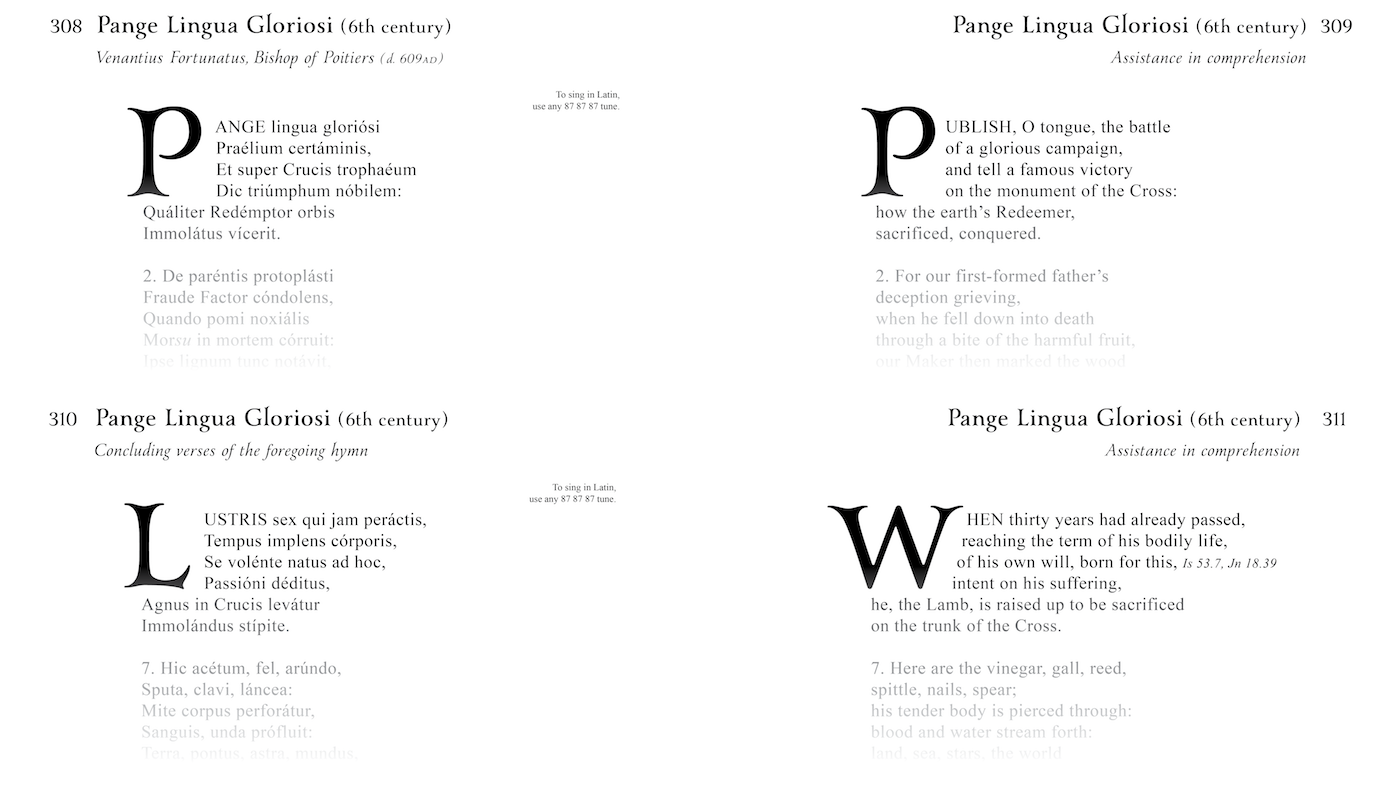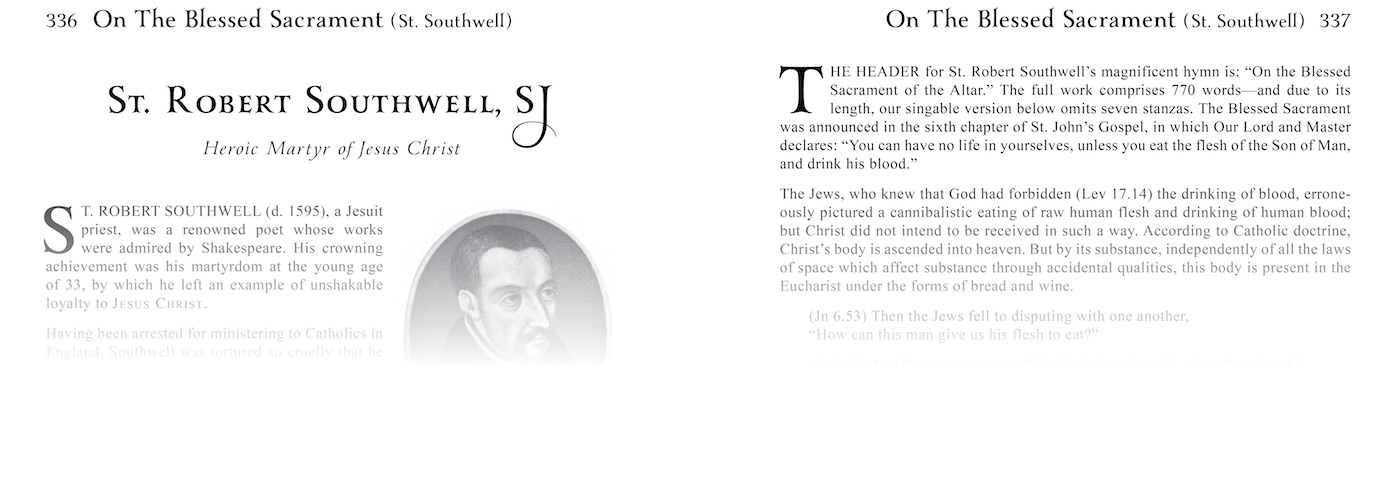Brebeuf Hymn Index
Ex More Docti Mystico
(“By holy custom taught, we raise”)
Translation: Fr. John Fitzpatrick, Oblate of Mary
EIGHTH TUNE: “Bressani” • 88 88 (LM)
Ex More Docti Mystico
(“By holy custom taught, we raise”)
Translation: Fr. John Fitzpatrick, Oblate of Mary
NINTH TUNE: “Gonfalon Royal” • 88 88 (LM)
Ex More Docti Mystico
(“By holy custom taught, we raise”)
Translation: Fr. John Fitzpatrick, Oblate of Mary
TENTH TUNE: “Melcombe” • 88 88 (LM)
Ex More Docti Mystico
(“By holy custom taught, we raise”)
Translation: Fr. John Fitzpatrick, Oblate of Mary
ELEVENTH TUNE: “Trinity College” • 88 88 (LM)
Ex More Docti Mystico
(“By holy custom taught, we raise”)
Translation: Fr. John Fitzpatrick, Oblate of Mary
Text only—can be used with any 88 88 (LM)
Hoste Dum Victo Triumphans
17th century
In addition to providing the Latin version with accent marks, the Saint Jean de Brébeuf Hymnal commissioned English translations from Latin scholars to help congregations appreciate these ancient prayers. Until the Brébeuf Hymnal appeared in 2018, literal translations for many of these hymns had never been made.
Hoste Dum Victo Triumphans
(“When the Patriarch was returning”)
Translation: Fr. Edward Caswall, Oratorian
FIRST TUNE: “All Saints” • 87 87 77
Hoste Dum Victo Triumphans
(“When the Patriarch was returning”)
Translation: Fr. Edward Caswall, Oratorian
SECOND TUNE: “Coblenz” • 87 87 77
Hoste Dum Victo Triumphans
(“When the Patriarch was returning”)
Translation: Fr. Edward Caswall, Oratorian
THIRD TUNE: “Westminster Abbey F7” • 87 87 77
Hoste Dum Victo Triumphans
(“When the Patriarch was returning”)
Translation: Fr. Edward Caswall, Oratorian
FOURTH TUNE: “Ich Begehr Nicht Mehr” • 87 87 77
Hoste Dum Victo Triumphans
(“When, the foe laid low, retiring”)
Translation: Fr. Dominic Popplewell
TUNE: “St Thomas (Webbe)” • 87 87 87
Hoste Dum Victo Triumphans
(“When, the foe laid low, retiring”)
Translation: Fr. Dominic Popplewell
Text only—can be used with any 87 87 87
Jam Christe Sol Justitiae
6th century
Title after 1631AD: “O Sol Salutis Intimis”
In addition to providing the Latin version with accent marks, the Saint Jean de Brébeuf Hymnal commissioned English translations from Latin scholars to help congregations appreciate these ancient prayers. Until the Brébeuf Hymnal appeared in 2018, literal translations for many of these hymns had never been made.
Jam Christe Sol Justitiae
(“O Sun of our salvation, rise”)
Translation: Judge Daniel Joseph Donahoe
FIRST TUNE: “Breslau” • 88 88 (LM)
Jam Christe Sol Justitiae
(“O Sun of our salvation, rise”)
Translation: Judge Daniel Joseph Donahoe
SECOND TUNE: “Rockingham” • 88 88 (LM)
Jam Christe Sol Justitiae
(“O Sun of our salvation, rise”)
Translation: Judge Daniel Joseph Donahoe
THIRD TUNE: “Cromer” • 88 88 (LM)
Jam Christe Sol Justitiae
(“O Sun of our salvation, rise”)
Translation: Judge Daniel Joseph Donahoe
FOURTH TUNE: “Hilderstone” • 88 88 (LM)
Jam Christe Sol Justitiae
(“O Sun of our salvation, rise”)
Translation: Judge Daniel Joseph Donahoe
FIFTH TUNE: “Song 34” • 88 88 (LM)
O Sol Salutis Intimis
(“O Sov’reign Sun, diffuse thy Light”)
Translation: Historic Roman Catholic Translation • 1706AD
Alongside the Latin—with textual accents—is printed a Roman Catholic (rhyming) translation of great historical interest. The version printed in the Brébeuf Hymnal is quite rare, and we were not able to obtain permission to post excerpts online.
Jam Christe Sol Justitiae
(“Thy rays, O Sun of Justice, send”)
Translation: John David Chambers
FIRST TUNE: “Gonfalon Royal” • 88 88 (LM)
Jam Christe Sol Justitiae
(“Thy rays, O Sun of Justice, send”)
Translation: John David Chambers
SECOND TUNE: “Rogers Park” • 88 88 (LM)
Jam Christe Sol Justitiae
(“Thy rays, O Sun of Justice, send”)
Translation: John David Chambers
THIRD TUNE: “Eisenach” • 88 88 (LM)
Jam Christe Sol Justitiae
(“Thy rays, O Sun of Justice, send”)
Translation: John David Chambers
FOURTH TUNE: “Kempen” • 88 88 (LM)
Jam Christe Sol Justitiae
(“Thy rays, O Sun of Justice, send”)
Translation: John David Chambers
FIFTH TUNE: “Agincourt” • 88 88 (LM)
Jam Christe Sol Justitiae
(“Thy rays, O Sun of Justice, send”)
Translation: John David Chambers
SIXTH TUNE: “Alfreton” • 88 88 (LM)
Jam Christe Sol Justitiae
(“Thy rays, O Sun of Justice, send”)
Translation: John David Chambers
SEVENTH TUNE: “Ioannes” • 88 88 (LM)
Jam Christe Sol Justitiae
(“Thy rays, O Sun of Justice, send”)
Translation: John David Chambers
Text only—can be used with any 88 88 (LM)
Jam Christe Sol Justitiae
(“O Jesus, our salvation’s Sun”)
Translation: Bishop Edward G. Bagshawe
TUNE: “Altona” • 88 88 (LM)
Jam Christe Sol Justitiae
(“O Jesus, our salvation’s Sun”)
Translation: Bishop Edward G. Bagshawe
Text only—can be used with any 88 88 (LM)
Jam Desinant Suspiria
by Fr. Charles Coffin (d. 1749)
(Literal) “Let sighs now cease”
In addition to providing the Latin version with accent marks, the Saint Jean de Brébeuf Hymnal commissioned English translations from Latin scholars to help congregations appreciate these ancient prayers. Until the Brébeuf Hymnal appeared in 2018, literal translations for many of these hymns had never been made.
Jam Desinant Suspiria
(“Ye people, cease from tears”)
Translation: Robert Campbell of Skerrington
TUNE: “Potsdam” • 66 86 (SM)
Jam Desinant Suspiria
(“Ye people, cease from tears”)
Translation: Robert Campbell of Skerrington
Text only—can be used with any 66 86 (SM)
Jesu Nostra Redemptio
7th century
Title after 1631AD: “Salutis Humanae Sator”
In addition to providing the Latin version with accent marks, the Saint Jean de Brébeuf Hymnal commissioned English translations from Latin scholars to help congregations appreciate these ancient prayers. Until the Brébeuf Hymnal appeared in 2018, literal translations for many of these hymns had never been made.
Jesu Nostra Redemptio
(“Redeemer of our fallen state”)
Translation: Fr. John Fitzpatrick, Oblate of Mary
FIRST TUNE: “La Rochelle” • 88 88 (LM)
Jesu Nostra Redemptio
(“Redeemer of our fallen state”)
Translation: Fr. John Fitzpatrick, Oblate of Mary
SECOND TUNE: “Rogers Park” • 88 88 (LM)
Jesu Nostra Redemptio
(“Redeemer of our fallen state”)
Translation: Fr. John Fitzpatrick, Oblate of Mary
THIRD TUNE: “Bressani” • 88 88 (LM)
Jesu Nostra Redemptio
(“Redeemer of our fallen state”)
Translation: Fr. John Fitzpatrick, Oblate of Mary
Text only—can be used with any 88 88 (LM)
Jesu Nostra Redemptio
(“O our redemption Jesus Christ”)
Translation: Historic Roman Catholic Translation • 1599AD
Alongside the Latin—with textual accents—is printed a Roman Catholic (rhyming) translation of great historical interest. The version printed in the Brébeuf Hymnal is quite rare, and we were not able to obtain permission to post excerpts online.
Salutis Humanae Sator
(“O Jesus, Savior of mankind”)
Translation: Historic Roman Catholic Translation • 1807AD
Alongside the Latin—with textual accents—is printed a Roman Catholic (rhyming) translation of great historical interest. The version printed in the Brébeuf Hymnal is quite rare, and we were not able to obtain permission to post excerpts online.
Jesu Redemptor Omnium
6th century
Title before 1631AD: “Christe Redemptor Omnium”
In addition to providing the Latin version with accent marks, the Saint Jean de Brébeuf Hymnal commissioned English translations from Latin scholars to help congregations appreciate these ancient prayers. Until the Brébeuf Hymnal appeared in 2018, literal translations for many of these hymns had never been made.
This hymn is referred to by the post-Urbanite name (“Jesu Redemptor Omnium”) to avoid confusion—since “Christe Redemptor Omnium” has the same name as the 9th-century hymn for All Saints by Rabanus Maurus.
Jesu Redemptor Omnium
(“Savior of all, for ever One”)
Translation: Msgr. Ronald A. Knox
FIRST TUNE: “Song 34” • 88 88 (LM)
Jesu Redemptor Omnium
(“Savior of all, for ever One”)
Translation: Msgr. Ronald A. Knox
SECOND TUNE: “Fulda” • 88 88 (LM)
Jesu Redemptor Omnium
(“Savior of all, for ever One”)
Translation: Msgr. Ronald A. Knox
THIRD TUNE: “Mein Seel O Gott” • 88 88 (LM)
Jesu Redemptor Omnium
(“Savior of all, for ever One”)
Translation: Msgr. Ronald A. Knox
FOURTH TUNE: “Cupertino” • 88 88 (LM)
Jesu Redemptor Omnium
(“Savior of all, for ever One”)
Translation: Msgr. Ronald A. Knox
FIFTH TUNE: “Symphoniacae” • 88 88 (LM)
Jesu Redemptor Omnium
(“Savior of all, for ever One”)
Translation: Msgr. Ronald A. Knox
Text only—can be used with any 88 88 (LM)
Jesu Redemptor Omnium
(“O Christ, Redeemer of the world”)
Translation: Fr. Edward Caswall, Oratorian
TUNE: “Altona” • 88 88 (LM)
Jesu Redemptor Omnium
(“O Christ, Redeemer of the world”)
Translation: Fr. Edward Caswall, Oratorian
Text only—can be used with any 88 88 (LM)
Jesu Redemptor Omnium
(“Lamb, whose blood for all men streamed”)
Translation: Robert Campbell of Skerrington
FIRST TUNE: “St George” • 77 77 D
Jesu Redemptor Omnium
(“Lamb, whose blood for all men streamed”)
Translation: Robert Campbell of Skerrington
TUNE: “Paschal Lamb” • 77 77 D
Jesu Redemptor Omnium
(“Lamb, whose blood for all men streamed”)
Translation: Robert Campbell of Skerrington
THIRD TUNE: “Heustis” • 77 77 D
Jesu Redemptor Omnium
(“Lamb, whose blood for all men streamed”)
Translation: Robert Campbell of Skerrington
Text only—can be used with any 88 88 (LM)
Christe Redemptor Omnium
(“O Christ redeemer of us all”)
Translation: Historic Roman Catholic Translation • 1599AD
Alongside the Latin—with textual accents—is printed a Roman Catholic (rhyming) translation of great historical interest. The version printed in the Brébeuf Hymnal is quite rare, and we were not able to obtain permission to post excerpts online.
Jesu Redemptor Omnium
(“Jesus, the Ransomer of man”)
Translation: Historic Roman Catholic Translation • 1778AD
Alongside the Latin—with textual accents—is printed a Roman Catholic (rhyming) translation of great historical interest. The version printed in the Brébeuf Hymnal is quite rare, and we were not able to obtain permission to post excerpts online.
Page 280
CHRIST THE KING — PRECIOUS BLOOD
Mundus Effusis Redemptus
1686AD
In addition to providing the Latin version with accent marks, the Saint Jean de Brébeuf Hymnal commissioned English translations from Latin scholars to help congregations appreciate these ancient prayers. Until the Brébeuf Hymnal appeared in 2018, literal translations for many of these hymns had never been made.
Page 282
CHRIST THE KING — PRECIOUS BLOOD
Mundus Effusis Redemptus
(“Sing, O earth, for thy redemption”)
Translation: Fr. Dominic Popplewell
TUNE: “All Saints” • 87 87 77
Page 283
CHRIST THE KING — PRECIOUS BLOOD
Mundus Effusis Redemptus
(“Sing, O earth, for thy redemption”)
Translation: Fr. Dominic Popplewell
Text only—can be used with any 87 87 77
Non Abluunt Lymphae Deum
1686AD
In addition to providing the Latin version with accent marks, the Saint Jean de Brébeuf Hymnal commissioned English translations from Latin scholars to help congregations appreciate these ancient prayers. Until the Brébeuf Hymnal appeared in 2018, literal translations for many of these hymns had never been made.
Non Abluunt Lymphae Deum
(“God needeth not the cleansing wave”)
Translation: Robert Campbell of Skerrington
TUNE: “Winchester New” • 88 88 (LM)
Non Abluunt Lymphae Deum
(“God needeth not the cleansing wave”)
Translation: Robert Campbell of Skerrington
Text only—can be used with any 88 88 (LM)
O Sola Magnarum Urbium
4th century
In addition to providing the Latin version with accent marks, the Saint Jean de Brébeuf Hymnal commissioned English translations from Latin scholars to help congregations appreciate these ancient prayers. Until the Brébeuf Hymnal appeared in 2018, literal translations for many of these hymns had never been made.
O Sola Magnarum Urbium
(“O Bethlehem, thou dost surpass”)
Translation: Fr. John Fitzpatrick, Oblate of Mary
FIRST TUNE: “Altona” • 88 88 (LM)
O Sola Magnarum Urbium
(“O Bethlehem, thou dost surpass”)
Translation: Fr. John Fitzpatrick, Oblate of Mary
SECOND TUNE: “Winchester New” • 88 88 (LM)
O Sola Magnarum Urbium
(“O Bethlehem, thou dost surpass”)
Translation: Fr. John Fitzpatrick, Oblate of Mary
THIRD TUNE: “Starry” • 88 88 (LM)
O Sola Magnarum Urbium
(“O Bethlehem, thou dost surpass”)
Translation: Fr. John Fitzpatrick, Oblate of Mary
FOURTH TUNE: “St Mark” • 88 88 (LM)
O Sola Magnarum Urbium
(“O Bethlehem, thou dost surpass”)
Translation: Fr. John Fitzpatrick, Oblate of Mary
FIFTH TUNE: “Trinity College” • 88 88 (LM)
O Sola Magnarum Urbium
(“O Bethlehem, thou dost surpass”)
Translation: Fr. John Fitzpatrick, Oblate of Mary
Text only—can be used with any 88 88 (LM)
O Sola Magnarum Urbium
(“Bethlehem! Of noblest cities”)
Translation: Fr. Edward Caswall, Oratorian
FIRST TUNE: “Stuttgart” • 87 87
O Sola Magnarum Urbium
(“Bethlehem! Of noblest cities”)
Translation: Fr. Edward Caswall, Oratorian
SECOND TUNE: “Bronzeville” • 87 87
O Sola Magnarum Urbium
(“Bethlehem! Of noblest cities”)
Translation: Fr. Edward Caswall, Oratorian
THIRD TUNE: “Cross of Jesus” • 87 87
O Sola Magnarum Urbium
(“Bethlehem! Of noblest cities”)
Translation: Fr. Edward Caswall, Oratorian
FOURTH TUNE: “Waltham” • 87 87
O Sola Magnarum Urbium
(“Bethlehem! Of noblest cities”)
Translation: Fr. Edward Caswall, Oratorian
FIFTH TUNE: “Merton” • 87 87
O Sola Magnarum Urbium
(“Bethlehem! Of noblest cities”)
Translation: Fr. Edward Caswall, Oratorian
Text only—can be used with any 87 87
O Sola Magnarum Urbium
(“Let other Cities strive, which most”)
Translation: Historic Roman Catholic Translation • 1706AD
Alongside the Latin—with textual accents—is printed a Roman Catholic (rhyming) translation of great historical interest. The version printed in the Brébeuf Hymnal is quite rare, and we were not able to obtain permission to post excerpts online.
O Sola Magnarum Urbium
(“A sacred town is Bethlehem”)
Translation: Judge Daniel Joseph Donahoe
FIRST TUNE: “St Bernard” • 86 86 (CM)
O Sola Magnarum Urbium
(“A sacred town is Bethlehem”)
Translation: Judge Daniel Joseph Donahoe
SECOND TUNE: “Bristol” • 86 86 (CM)
O Sola Magnarum Urbium
(“A sacred town is Bethlehem”)
Translation: Judge Daniel Joseph Donahoe
Text only—can be used with any 86 86 (CM)
O Sola Magnarum Urbium
(“The noblest cities on the earth”)
Translation: Henry Trend
TUNE: “Erschienen Ist” • 88 88 A
O Sola Magnarum Urbium
(“The noblest cities on the earth”)
Translation: Henry Trend
Text only—can be used with any 88 88 (LM)
Pange Lingua Gloriosi
6th century
Notice the 6th-century version is by Bishop Fortunatus, not Saint Thomas Aquinas
In addition to providing the Latin version with accent marks, the Saint Jean de Brébeuf Hymnal commissioned English translations from Latin scholars to help congregations appreciate these ancient prayers. Until the Brébeuf Hymnal appeared in 2018, literal translations for many of these hymns had never been made.
Pange Lingua Gloriosi
(“Sing, my tongue, the Savior’s glory”)
Translation: Fr. Edward Caswall, Oratorian
FIRST TUNE: “Runnells” • 87 87 87
6th century
Pange Lingua Gloriosi
(“Sing, my tongue, the Savior’s glory”)
Translation: Fr. Edward Caswall, Oratorian
SECOND TUNE: “Breton” • 87 87 87
6th century
Pange Lingua Gloriosi
(“Sing, my tongue, that glorious combat”)
Translation: Fr. John Fitzpatrick, Oblate of Mary
FIRST TUNE: “Ad Perennis Vitae Fontem” • 87 87 87
6th century
Pange Lingua Gloriosi
(“Sing, my tongue, that glorious combat”)
Translation: Fr. John Fitzpatrick, Oblate of Mary
SECOND TUNE: “St Leonard” • 87 87 87
6th century
Pange Lingua Gloriosi
(“Sing, my tongue, that glorious combat”)
Translation: Fr. John Fitzpatrick, Oblate of Mary
THIRD TUNE: “Oriel” • 87 87 87
6th century
Pange Lingua Gloriosi
(“Let our tongues sing out the story”)
Translation: Adaptation by Fr. Dylan Schrader
FIRST TUNE: “Regent Square” • 87 87 87
6th century
Pange Lingua Gloriosi
(“Let our tongues sing out the story”)
Translation: Adaptation by Fr. Dylan Schrader
SECOND TUNE: “Davost” • 87 87 87
6th century
Pange Lingua Gloriosi
(“Let our tongues sing out the story”)
Translation: Adaptation by Fr. Dylan Schrader
THIRD TUNE: “Westminster Abbey F” • 87 87 87
6th century
Pange Lingua Gloriosi
(“Let our tongues sing out the story”)
Translation: Adaptation by Fr. Dylan Schrader
FOURTH TUNE: “Lauda Anima” • 87 87 87
6th century
Pange Lingua Gloriosi
(“Sing, O my Tongue, the glorious Crown”)
Translation: Historic Roman Catholic Translation • 1717AD
6th century
Alongside the Latin—with textual accents—is printed a Roman Catholic (rhyming) translation of great historical interest. The version printed in the Brébeuf Hymnal is quite rare, and we were not able to obtain permission to post excerpts online.
Pange Lingua Gloriosi
(“Sing, my tongue, of warfare ended”)
Translation: Msgr. Ronald A. Knox
FIRST TUNE: “Mannheim” • 87 87 87
6th century
Pange Lingua Gloriosi
(“Sing, my tongue, of warfare ended”)
Translation: Msgr. Ronald A. Knox
SECOND TUNE: “Picardy” • 87 87 87
6th century
Pange Lingua Gloriosi
(“Sing the Cross! the conflict telling”)
Translation: Dr. Hamilton M. Macgill
TUNE: “Dulce Carmen” • 87 87 87
6th century
Pange Lingua Gloriosi + Crux Fidelis
(“Come then, my soul, and gladly sing”)
Translation: Historic Roman Catholic Translation • 1670AD
TUNE: “Innsbruck M8” • 886 D
6th century
On The Blessed Sacrament
16th century
Information about Saint Robert Southwell and his hymn on the Holy Eucharist.
On The Blessed Sacrament
(“In Paschal feast, the end of ancient rite”)
Translation: St. Robert Southwell, Martyr of Jesus Christ
FIRST TUNE: “Song 1” • 10 10 10 10 10 10
On The Blessed Sacrament
(“In Paschal feast, the end of ancient rite”)
Translation: St. Robert Southwell, Martyr of Jesus Christ
SECOND TUNE: “Enemond” • 10 10 10 10 10 10
Pange Lingua Gloriosi
1264AD
Notice the 13th-century version is by Saint Thomas Aquinas, not Bishop Fortunatus.
In addition to providing the Latin version with accent marks, the Saint Jean de Brébeuf Hymnal commissioned English translations from Latin scholars to help congregations appreciate these ancient prayers. Until the Brébeuf Hymnal appeared in 2018, literal translations for many of these hymns had never been made.
The final two verses are “TANTUM ERGO SACRAMENTUM.”
Pange Lingua Gloriosi
by St. Thomas Aquinas
Translation: Textus originalis Latinus
TUNE: Gregorian Chant • 87 87 87
Pange Lingua Gloriosi
(“Sing, my tongue, the Savior’s glory”)
by St. Thomas Aquinas
Translation: Fr. Edward Caswall, Oratorian
Text only—can be used with any 87 87 87




























































































